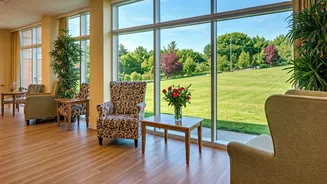Dispelling Common Myths
One of the initial hurdles in understanding senior living in India is the persistence of several myths. Often, there's a misconception that senior living is synonymous
with isolation and abandonment. However, this is far from the truth. Modern senior living communities often provide a vibrant environment, with social activities, clubs, and opportunities for interaction. Another myth suggests that senior living is solely for the wealthy. While some luxury options exist, various affordable choices cater to diverse income levels. Furthermore, it's a misconception that senior living signifies the end of an active life. Many communities actively encourage residents to pursue hobbies, continue learning, and engage in physical activities, fostering a sense of purpose and well-being. It is important to look at the differences between the truth and the myths.
The Realities of Today
The reality of senior living in India has undergone a significant transformation. Today's communities offer a range of amenities designed to enhance the quality of life. These can include healthcare services, well-equipped fitness centers, and recreational facilities. The emphasis has shifted toward promoting independence and providing support when needed. Senior living facilities are often strategically located to offer easy access to essential services and entertainment options. Many communities are now designed with accessibility in mind, incorporating features like ramps, grab bars, and wider doorways to accommodate mobility challenges. Furthermore, the concept of co-living, where seniors share accommodations and responsibilities, is gaining popularity, providing companionship and affordability. This shift helps to create a more integrated and supportive environment.
Embracing Purposeful Ageing
Purposeful ageing is about embracing life after retirement. This includes activities that provide meaning and satisfaction. It's about staying active, both mentally and physically, through hobbies, volunteering, and learning new skills. Many seniors find fulfilment by engaging in community service. This could involve mentoring younger generations, contributing to local initiatives, or participating in charitable work. Others discover new passions, such as painting, gardening, or writing. Continuing to learn is another key aspect. It helps keep the mind sharp and opens up new avenues for exploration. This could involve taking online courses, joining book clubs, or attending workshops. Purposeful ageing emphasizes a holistic approach to well-being, focusing on physical, mental, and social health.
Community Living Benefits
Community living offers numerous advantages. One major benefit is the sense of belonging and social interaction. Living among peers fosters friendships and reduces feelings of isolation. Senior communities often organize various social events, clubs, and activities, ensuring there are plenty of opportunities for interaction. Another significant benefit is the availability of support services. Many communities provide assistance with daily tasks, such as housekeeping, meal preparation, and transportation. Healthcare services are often available on-site, providing residents with peace of mind. Safety and security are also important considerations. Senior living facilities typically have enhanced security measures, ensuring a secure and protected environment. Furthermore, community living can simplify life by reducing the burdens of home maintenance, allowing seniors to focus on enjoying their retirement years.
Planning for the Future
Planning for senior living involves careful consideration of several factors. It's essential to assess one's financial situation to determine the affordability of different options. This includes evaluating the costs of living, including monthly fees, and potential healthcare expenses. Researching various communities is crucial. This involves visiting facilities, asking questions, and gathering information about the services and amenities offered. Considering healthcare needs is also important. Some communities specialize in assisted living or memory care, providing specialized support for residents with specific health conditions. The location is an important element. Consider proximity to family, friends, and essential services. Finally, engaging in open conversations with family members about expectations and preferences is also important to ensure everyone is on the same page and to make informed decisions.













